#actually dysgeographic
Text
there’s nothing wrong with needing to use gps directions to get everywhere.
it doesn’t mean you’re “stupid”, it doesn’t mean you’re not trying hard enough or not paying enough attention. it doesn’t mean you’re doing something wrong or taking the easy way out. it doesn’t mean you shouldn’t be allowed to be independent.
yes, even if you need it to get somewhere you’ve been a million times before. even if you need it to get around the town you’ve lived in your entire life. even if other people think you should be able to go without it.
if you wouldn’t judge another disabled person for using certain tools that let them live more independently, don’t judge yourself for doing the same.
and never ever let someone else shame you into going out into the world without the tools that allow you to feel safe.
these tools exist to be used, so use them if you need them. there’s no shame in needing help.
#this post brought to you by ‘my parents make me feel bad for needing to use google maps all the time’#positivity#ableism#dysgeographica#actually dysgeographic#developmental topographical disorientation#neurodivergent#neurodiverse#actually neurodivergent#neurodiversity#neuroqueer#neurodivergent positivity#neurodivergent community#developmentally disabled#developmental disabilities#neurodevelopmental disorders#disability#actually disabled#disability education#disability awareness#disability community#disability positivity#directionally challenged#sense of direction#accommodation#accommodating disability
739 notes
·
View notes
Text
That fun dysgeographica feel when you’re planning ahead to go somewhere you’ve never been before and your brain pulls the whole ‘WHERE IS THIS PLACE EXACTLY????? AND WHY ARE THERE NO CLEAR ANSWERS?!’

😨😨😨😨
#dysgeographica#my life#neurodivergent#neurodiversity#don't get me wrong- my phone has GPS#but I DO NOT want to get lost when I try to go to the thing#and since I can't tell if I'm supposed to get off the bus at a certain spot#or wait until the street the route planner says I should#and I can't tell if they're the same spot or not#AND the thing says there's 5 stops for what looks like it's supposed to be just 1 location#my dysgeographic ass is confused and not clear AT ALL on where my stop is#I just hope that the map on the GPS is up to date with the street layout#because NOTHING is as gd confusing as when the street signs and layout#don't match what the GPS says they should be#that shit actually made me late af for an interview once#and is probably why I didn't get that job#SIGH#it'd also be really nice to avoid the bullshit of a panic attack in the worst case scenario
4 notes
·
View notes
Text
what’s dysgeographica?
dysgeographica, also known as developmental topographical disorientation, is a form of neurodivergence in which a person has difficulty creating mental maps, orienting themselves or a location in space, and navigating from place to place.
some common symptoms of dysgeographica include:
getting lost easily, even in one's own neighborhood or other extremely familiar locations
difficulty memorizing even simple or frequently traveled routes
no internal compass (i.e. no sense of which way one is facing or if one has been turned around)
no sense of where familiar locations are in relation to each other
difficulty making a mental map of a building or area's layout
uncertainty about which direction a location is in, even if one knows how to get there
complete reliance on GPS navigation while traveling
rigidly following one familiar route to get somewhere, even if a better route may be available
anxiety around driving a car due to lack of confidence in one's ability to navigate as the driver
is dysgeographica just a poor sense of direction?
while many people struggle to read maps or navigate unfamiliar places, being dysgeographic means struggling with very familiar locations as well as unfamiliar ones, potentially getting lost in one's own neighborhood or workplace.
additionally, while someone who just has a poor sense of direction will generally still be able to move through the world and perform daily life activities with little to no added difficulty or distress, dysgeographic people will often find that their difficulty navigating makes day-to-day functioning more difficult (e.g. being late to work regularly due to getting lost, not being able to drive a car or travel alone).
is dysgeographica part of adhd/autism/etc?
it is possible to have dysgeographica with comorbid autism, adhd, dyslexia, dyscalculia, dyspraxia, etc. it's also possible to experience dysgeographic symptoms as secondary to one of those (e.g. having trouble navigating due to adhd inattention).
that being said, dysgeographica is not inherently connected to any other form of neurodivergence, and can be the only neurodivergence someone has. you don't need to be diagnosed with anything else to have dysgeographica.
is dysgeographica a disability?
yes, dysgeographica is a neurodevelopmental disability.
it is not, however, recognized as such by the DSM or ICD, despite research showing evidence of its existence and the impact it can have on people's lives. that doesn’t mean it’s not a real disability — what it does mean is that it can be very difficult (if not impossible) to get accommodations.
while dysgeographica would most likely not be categorized as a specific learning disability, it does have some overlap with dyscalculia and dyslexia, and can be considered a “cousin” of the specific learning disabilities much in the same way as dyspraxia.
#resource#dysgeographica#actually dysgeographic#developmental topographical disorientation#neurodivergent#actually neurodivergent#neurodivergent community#neurodiversity#neuroqueer#neurospicy#developmentally disabled#developmental disabilities#neurodevelopmental disorders#disability education#disability awareness#disability community#disability#directionally challenged#sense of direction
244 notes
·
View notes
Text
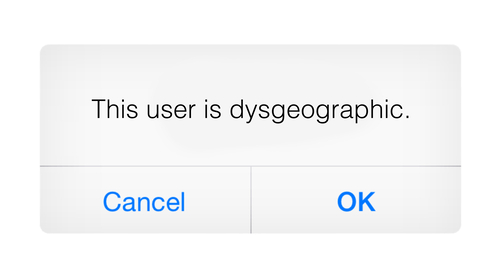
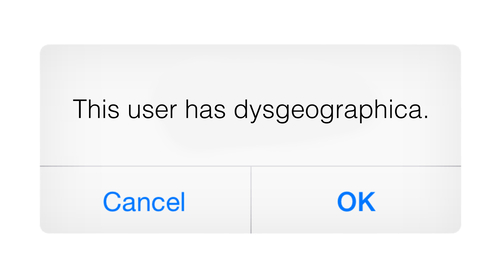
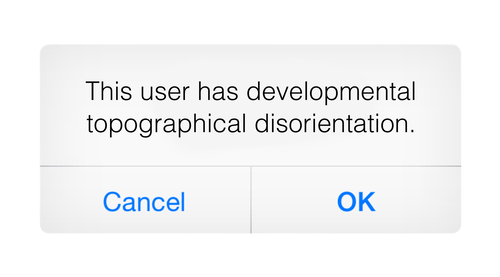

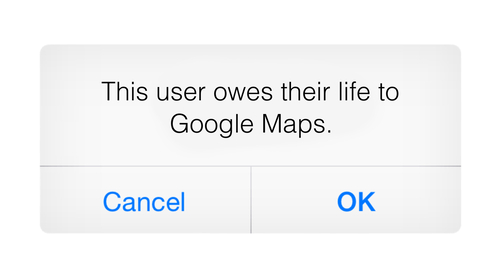


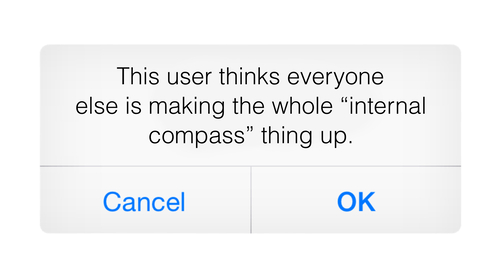
dysgeographica alert-style userboxes
#userbox#this user#dysgeographica#actually dysgeographic#developmental topographical disorientation#neurodivergent#neurodivergence#actually neurodivergent#neurodivergent community#neuroqueer#neurospicy#developmentally disabled#developmental disabilities#neurodevelopmental disorders#disability#actually disabled#disability community#directionally challenged#sense of direction
57 notes
·
View notes
Text
dysgeographica is not rare — it’s just rarely discussed.
dysgeographica, sometimes referred to as developmental topographical disorientation, is a neurodevelopmental disability that primarily affects a person’s sense of direction and ability to navigate.
a 2022 study of italian young adults found that 3% of their sample met their criteria for having dysgeographica.
while this is a statistic from one study of one population and there aren’t very many other studies out there that we can compare it with to gauge its overall accuracy, it does give us some idea. so, let’s assume for now that that is accurate and approximately 3% of all people are dysgeographic.
it might sound small, but do you know how much 3% of the population actually is?
3% of the population is…
more than people with red hair.
more than people with green eyes.
roughly equal to autistic people.
one person in a group of 33 people.
six people in a 200 seat lecture hall.
190 students at the average college.
over 25,000 people in new york city.
almost 10 million people in the US.
over 47 million people in the whole world. that’s more than the total amount of people in kenya, the 26th largest country in the world. there are enough of us to have our own country!
to be classified as rare in the US, something has to affect a maximum of 200,000 people in the entire country. the (estimated) number of dysgeographics is 50 times that.
so no — as far as current studies can tell, dysgeographica is not rare!
if it’s not rare, then, why have you probably never heard of it? why are there so few people who know they’re dysgeographic?
because it’s just not being talked about, and it hasn’t been recognized by influential medical organizations or given a place in their official diagnostic guides.
that leaves the vast majority of dysgeographics not knowing why they can’t get around the way other people can or that there’s a name for the way their brains work. some may come up with their own explanations for the things they struggle with, but others will simply assume the people who judged them were right — that they’re just not “smart enough” or not trying hard enough to get it right.
and even those of us who do know we’re dysgeographic will have a hard time finding other people like us or getting access to any of the accommodations or other resources and support we might need.
i, for one, think that’s far too many people being left in the dark about their own neurotype, so let’s talk about it more.
#resource#watch me find a wildly different number in a study i haven’t read yet. bc that’s my luck#the point stands tho that even if the 3% isn’t exactly right it’s Not Rare#dysgeographica#actually dysgeographic#developmental topographical disorientation#neurodivergent#actually neurodivergent#neurodivergent community#neurodivergent education#neurodivergent awareness#neurodiverse#neurodiversity#developmental disabilities#developmentally disabled#neurodevelopmental disorders#disability#actually disabled#disability community#disability education#disability awareness#directionally challenged#sense of direction
34 notes
·
View notes
Note
This blog is the first im hearing of this. Do you know anything about telling the difference between this and aphantasia?
basically, aphantasia is about not being able to visualize while dysgeographica is about not being able to navigate. those tow things can overlap — namely, an aphantasic person and a dysgeographic person might share the inability to visualize mental maps. but that’s just the middle of the venn diagram.
so an aphantasic person won’t only be unable to visualize mental maps, they’ll be unable to visualize anything at all, while a dysgeographic person could have an incredibly vivid visual imagination when it comes to everything else. and a dysgeographic person will likely struggle with aspects of navigation other than mental maps, while an aphantasic person could be able to navigate just fine without actually seeing the mental map in their head.
obviously, these are generalizations, but it should give you an idea of the differences between the two.
i also wouldn’t be surprised if dysgeographica is related to aphantasia, though, given the overlap between the two. i know there’s evidence of a connection between dysgeographica and prosopagnosia for a similar reason — they both affect a person’s ability to create visual representations in their head, whether it be places or faces — so i can see aphantasia also being related in that way.
generally speaking, though, if you’re trying to identify which one you’re experiencing, i think the two basic questions to ask are “do you have trouble with visualization when it comes to things other than maps/places?” and “do you struggle with aspects of navigation other than seeing the maps/places in your head?”
i hope that helps!
#ask answered#resource#aphantasia#dysgeographica#actually dysgeographic#developmental topographical disorientation#neurodivergent#actually neurodivergent#neurodiverse#neurodiversity#neuroqueer#neurospicy#developmentally disabled#developmental disabilities#neurodevelopmental disorders#disability#actually disabled#directionally challenged#sense of direction
22 notes
·
View notes
Text
dysgeographica culture is almost having a panic attack in your car in the parking lot of a place you’ve been going to for years because there isn’t enough cell service to load google maps and you have no idea how to get back home on your own.
#who let me get a driver’s license#who let that happen#like i love being independent but. did we really think this through#culture is#dysgeographica#actually dysgeographic#developmental topographical disorientation#neurodivergent#actually neurodivergent#neurodivergent culture#neurodiversity#neurodiverse#neuroqueer#neurospicy#developmental disabilities#developmentally disabled#neurodevelopmental disorders#disability#actually disabled#disability culture#directionally challenged#sense of direction
21 notes
·
View notes
Text
dysgeographica culture is having no idea how people can play entire d&d campaigns in just theater of the mind because holy shit how do you know where anything is or what things look like just from a description????? like sure i can try to imagine it but the version in my head will not look how it’s supposed to
#every time a map comes out in critical role im SHOCKED#like idk how i thought it was supposed to look but i Certainly didn’t think it was That#culture is#dysgeographica culture#dysgeographica#actually dysgeographic#developmental topographical disorientation#neurodivergent#actually neurodivergent#neurodivergent culture#neurodiverse#neurodiversity#neurodivergent community#neuroqueer#neurospicy#developmentally disabled#developmental disabilities#neurodevelopmental disorders#disability#actually disabled#disability culture#disabled culture#disability community#directionally challenged#sense of direction
13 notes
·
View notes
Text
dysgeographic culture is loving the subway because it just takes you where you need to go and all you have to figure out is where to get on and off…but also hating the subway because knowing where to get on and off conceptually is not the same as actually doing that without ending up in the wrong place (and subway stations are never laid out in a way that makes literally any sense)
#just visited nyc and was once again faced with this struggle#culture is#dysgeographica#actually dysgeographic#developmental topographical disorientation#neurodivergent#actually neurodivergent#neurodivergent culture#disability#actually disabled#disabled culture#developmentally disabled#developmental disabilities#neurodevelopmental disorders#directionally challenged#sense of direction
10 notes
·
View notes
Text

your fave is dysgeographic:
thorin oakenshield from the hobbit is dysgeographic!
requested by @fire-fira
#your fave is#headcanon#thorin oakenshield#the hobbit#dysgeographica#actually dysgeographic#developmental topographical disorientation#neurodivergent#actually neurodivergent#neurodivergent headcanon#your fave is neurodivergent#neurodiverse#neurodiversity#neuroqueer#neurospicy#developmentally disabled#developmental disabilities#neurodevelopmental disorders#disability#actually disabled#your fave is disabled#disability headcanon#directionally challenged#sense of direction
8 notes
·
View notes
Text
dysgeographica culture is getting hopelessly lost in big open world games like breath of the wild and minecraft…and also in smaller-scale games like animal crossing
#you DONT wanna know how many times ive gotten lost on my little island#with stuff like botw i literally just have to follow along with a let’s play and go exactly where they go#bc otherwise i will never get anywhere important ever#idk how my bf is so good at getting around in them it’s ridiculous#culture is#dysgeographica culture#dysgeographica#actually dysgeographic#developmental topographical disorientation#neurodivergent#actually neurodivergent#neurodiverse#neurodiversity#neuroqueer#neurospicy#neurodivergent community#neurodivergent culture#developmentally disabled#developmental disabilities#neurodevelopmental disorders#disability#actually disabled#disability culture#disabled culture#disability community#directionally challenged#sense of direction
4 notes
·
View notes
Text

your fave is dysgeographic:
chidi anagonye from the good place is dysgeographic!
#this is like. essentially canon right#your fave is#representation#dysgeographica#actually dysgeographic#developmental topographical disorientation#neurodivergent#actually neurodivergent#your fave is neurodivergent#neurodiverse#neurodiversity#neuroqueer#neurospicy#neurodivergent representation#developmental disabilities#developmentally disabled#neurodevelopmental disorders#disability#actually disabled#disability representation#directionally challenged#sense of direction#chidi anagonye#the good place
3 notes
·
View notes
Text
dysgeographica culture is taking years and years to learn how to get from your house to your best friend’s house…only to realize they literally live down the street.
(and then only realizing years after that that your old daycare was also just down the street and not across town.)
#I think it took me 6??? years???#and then like 6 or 7 more years to realize the daycare was there#culture is#dysgeographica#actually dysgeographic#developmental topographical disorientation#neurodivergent#actually neurodivergent#neurodiversity#neurodiverse#neurodivergent community#neuroqueer#neurospicy#developmental disabilities#developmentally disabled#neurodevelopmental disorders#disability#actually disabled#disability culture#disabled culture#disability community#directionally challenged#sense of direction
2 notes
·
View notes
Text
looking up papers on dysgeographica and i just found multiple titles that start with the words “where am i?”
and honestly, yeah, you did it! you broke dysgeographica down to its bare essentials!
#hoping to make some posts breaking down what different studies say#so i started compiling all the studies i could find#and i just can’t get over this#misc thoughts#dysgeographica#actually dysgeographic#developmental topographical disorientation#neurodivergent#actually neurodivergent
2 notes
·
View notes
Text

your fave is dysgeographic:
fjord stone from critical role is dysgeographic!
#*slaps fjord* this half orc can hold so many headcanons inside him#your fave is#headcanon#dysgeographica#actually dysgeographic#developmental topographical disorientation#neurodivergent#actually neurodivergent#neurodivergent headcanon#neurodiverse#neurodiversity#neuroqueer#neurospicy#developmental disabilities#developmentally disabled#neurodevelopmental disorders#disability#actually disabled#disability headcanon#directionally challenged#sense of direction#fjord stone#critical role
1 note
·
View note
Note
I saw you reblog a dygeographica post from me, and I just wanted to thank you for making this blog. This is the kind of resource that's beyond helpful to have, and I appreciate seeing it.
i really appreciate that!
one of your posts was actually one of the things that helped me realize dysgeographica was even a thing i could have. i was honestly shocked to find out there wasn’t really anything like this here already so i figured, why not make it myself?
it’s very much in the early stages right now, but i am really hoping it can become a real resource for people as it grows!
#ask answered#dysgeographica#actually dysgeographic#developmental topographical disorientation#neurodivergent#actually neurodivergent
1 note
·
View note